Below the ocean waves, many deadly reptiles and fish hunt their prey in astonishing fashions. Among the most frightening creatures to hunt below the water are sharks and crocodiles. A crocodile vs shark fight pits two of the most dangerous animals against each other. What if we wanted to take the contest to the highest level and put a great white shark vs saltwater crocodile? Who wins this match?
We’re going to take the measure of each creature, factor in the most pertinent data, and show you which of these creatures would stand the best chance of winning an underwater battle.
Comparing a Great White Shark and a Saltwater Crocodile
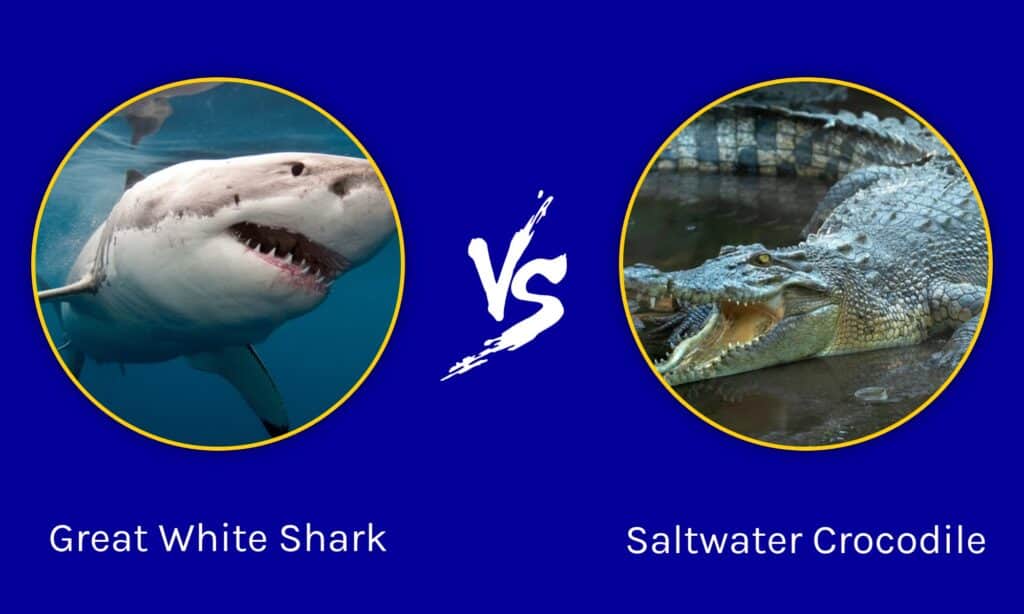
| Great White Shark | Saltwater Crocodile | |
|---|---|---|
| Size | Weight: 1,150-2,450lbs Length: 18ft – 21ft | Weight: 300-1,500lbs on average, up to 2,000lbs Length: 10ft – 20ft |
| Speed and Movement Type | – 20mph-35mph – Undulating, side-to-side motion for the tail and body. | – 15mph in water propelled by its tail – 22 mph on land – Very fast crawling motion |
| Attacking Methods | – 4000 PSI Bite Power (18,000 Newtons bite power) – About 50 teeth are available to bite in the first row, but 300 teeth overall – Teeth 4-6 inches long | – 3,700PSI bite power – Incredibly powerful bite – Death roll can instantly remove large chunks of flesh – 4-inch teeth – 66 teeth |
| Defenses | – Large size – Bursts of swim speed | – Tough skin – Ability to travel on land and water – Speed |
| Predatory Behavior | – Both an opportunistic and ambush predator that attacks from below an enemy | – Ambush predators that wait in the water for prey to approach. |
What Are Key Differences Between a Great White Shark and a Saltwater Crocodile?
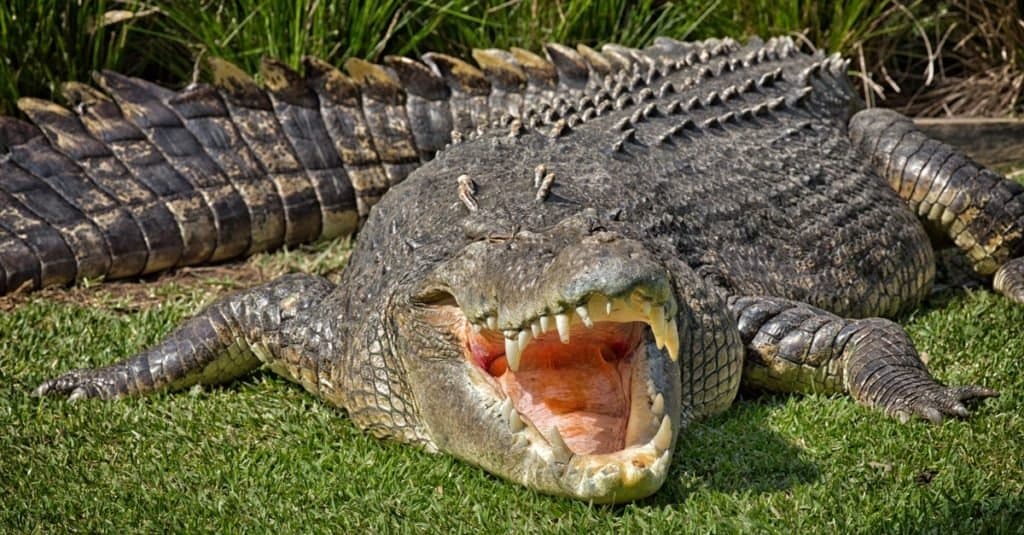
Saltwater crocodiles are large semiaquatic reptiles.
©PomInOz/Shutterstock.com
The greatest differences between a great white shark and a saltwater crocodile are their morphology and habitats. Great white sharks are large cartilaginous fish that live in temperate ocean environments. Saltwater crocodiles are large semiaquatic reptiles that live in coastal areas from India to the northern coast of Australia.
Both animals are among the largest of their species and are recognized as apex predators in their environments. Nevertheless, the differences between these animals are significant. By parsing their unique qualities and examining pertinent elements, we can determine the winner of this battle.
What Are the Key Factors in a Fight Between a Great White Shark and a Saltwater Crocodile?
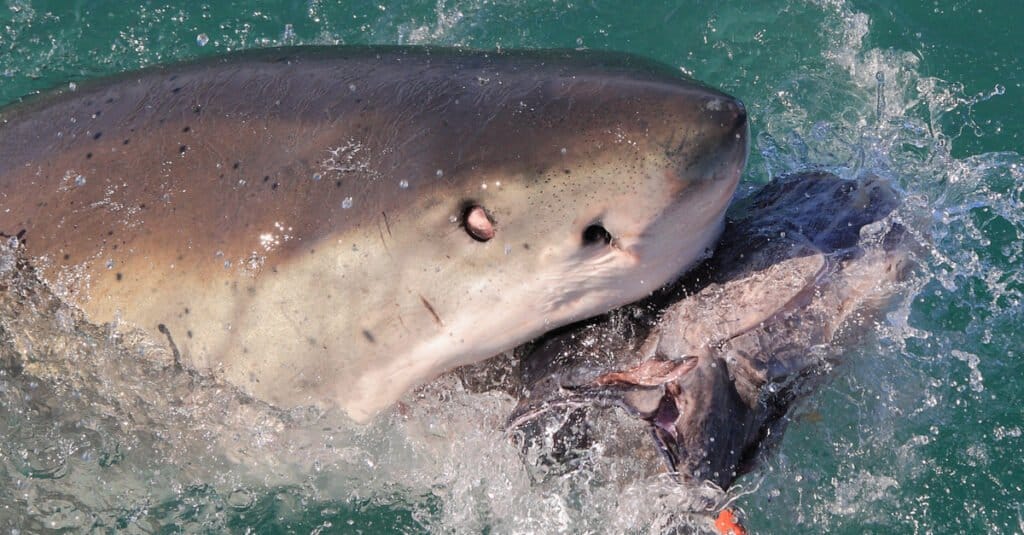
Great white sharks have a tremendous combination of speed and power to help them hunt.
©Alessandro De Maddalena/Shutterstock.com
The key factors in a fight between a great white shark and a saltwater crocodile include their size, power, and the way they engage their foes.
We’ll look at five broad categories of data that greatly impact the outcome of fights between animals. By the time we’re finished examining elements of size, defenses, and others, we’ll have a very good idea of which animal has the most advantages in a fight. With that information, we can make an educated guess on which creature is most likely to win a battle.
Great White Shark vs Saltwater Crocodile: Size
A great white shark is larger than a saltwater crocodile. A great white shark can reach 21ft long and weigh 2,400lbs. The saltwater crocodile can grow up to 1,500lbs and 20ft long, but heavier and longer variants have been seen. On average, the great white shark is bigger.
The great white shark has the size advantage over the crocodile.
Great White Shark vs Saltwater Crocodile: Speed and Movement
Great white sharks are perfect hunting animals in the water, and part of their success stems from their speed and movement. These sharks can reach amazing speeds of 25 mph to 35 mph. Saltwater crocodiles are fast as well. They can reach speeds of 15 mph in the water.
Sharks have a speed advantage over saltwater crocodiles.
Great White Shark vs Saltwater Crocodile: Attacking Methods
Saltwater crocodiles attack their prey with their teeth and powerful jaws. These animals can generate up to 3,700PSI bites, driving their 4-inch teeth into their enemy’s flesh. These teeth are designed to keep their prey in place while puncturing deep into their body.
Crocodiles will often use a death roll to disorient their prey and rip off chunks of flesh. Exsanguination, broken bones and punctured organs are all commonly seen in these brutal attacks.
Great white sharks are equally terrifying, locating their enemies using specialized sensory organs and then attacking from the deep. They slam into their enemies while delivering a powerful bite. These bites can reach 4,000 PSI in power, with 50, 6-inch-long teeth tearing into the prey. Their teeth are meant to bite and tear away the flesh on their own rather than keep prey from moving.
With each bite taking up to 30lbs of flesh from their prey’s body, they don’t need a fancy spinning move. They tear through their foes until nothing is left.
Both creatures are incredibly deadly, so they are tied in terms of their attacking methods.
Great White Shark vs Saltwater Crocodile: Physical Defenses
Saltwater crocodiles have very powerful physical defenses in the form of tough skin, the ability to move quickly, and the fact that they can move well on land and in water. Moreover, their size ensures that few animals attack them.
Great white sharks have their large size and bursts of swim speed to keep them safe. Combined with their finely tuned senses, few creatures can get the drop on a great white shark.
Saltwater crocodiles have more substantial defenses than great white sharks.
Great White Shark vs Saltwater Crocodile: Predatory Behaviors
A great white shark is an incredible apex predator that uses ambush predation and opportunistic feeding to find prey. The shark usually finds prey with its extraordinary senses, rapidly swims at them, and uses its powerful bite to land a devastating strike. They’re much too fast and violent for most prey to outrun.
The saltwater crocodile is an ambush predator that waits for prey to come by while keeping all but its eyes underwater. When something gets close to the edge, the crocodile will swim up, sometimes completely submerged, and attack the prey. They’ll drag the animal into the water after they bite and then inflict more bites or engage in a death roll.
Both animals are amazing predators, but the shark’s predatory skills are enhanced by its senses.
Who Would Win in a Fight Between a Great White Shark and a Saltwater Crocodile?
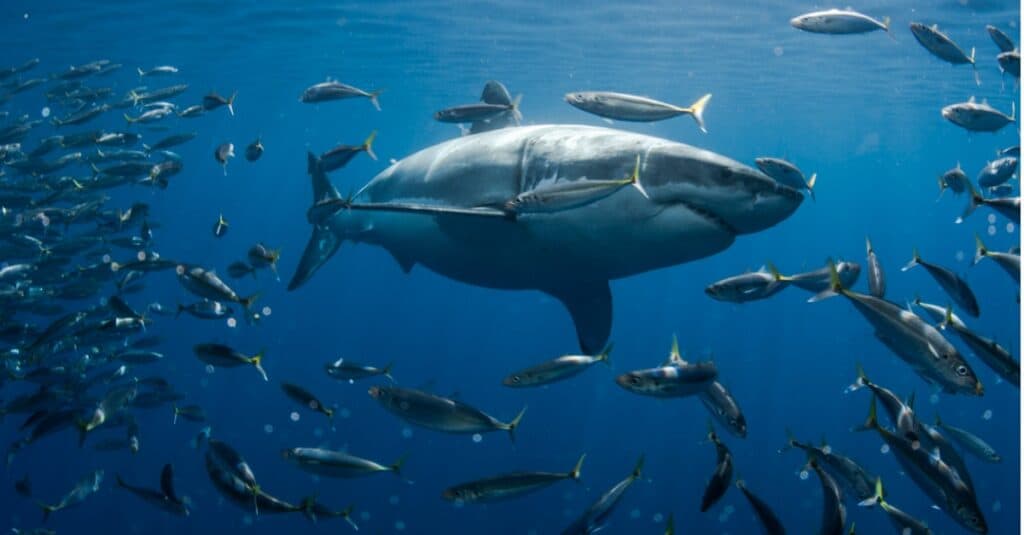
The great white shark is a carnivorous apex predator poised to win this fight.
©iStock.com/atese
A great white shark would win a fight against a saltwater crocodile. These deadly creatures are incredibly powerful, but the great white shark has an amazing advantage in the water. Not only would this animal probably notice the crocodile first, but it also has the speed to land a devastating attack.
The saltwater crocodile likes to swim between islands, sometimes up to 30 miles away from its home range. The shark would attack from the bottom in deeper water, crashing into the reptile and taking a massive bite out of it. This fight would end quickly in most cases.
If we somehow put both animals in a tank, then the fight would be a little more interesting. Still, the size difference and the fight would bear down to a biting contest that put victory out of the crocodile’s reach.
What Animal Can Take Down a Great White Shark?
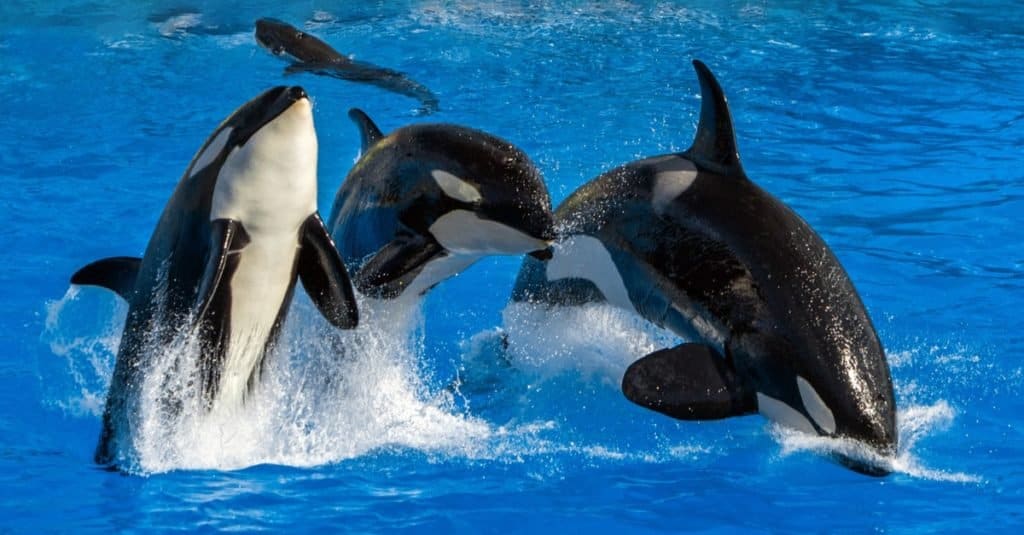
Orcas are capable of weighing over 13,000 lbs and reaching lengths of 26 feet
©Andrea Izzotti/Shutterstock.com
In spite of its status as fearsome apex predator, the great white shark’s existence in the endless blue ocean is not entirely devoid of risk or danger. Not when there are predators which are larger and heavier, and have a habit of hunting in pods.
Those predators are none other than orcas (Orcinus orca) dolphins’ larger cousins with excellent hunting instincts. A male orca is capable of reaching 26 feet in length compared to a great white’s maximum length of 19.1 feet. Male members of this cetacean species are also capable of tipping the scales at 13,220 lbs, almost four times the maximum weight of a great white shark at 4,410 lbs.
What’s more, a bite force of 19,000 psi also ups orcas’ risk factor significantly for great whites which are only capable of managing 4,000 psi.
Do orcas actually hunt great whites? They do. They are actually partial to their livers which are packed with oil and nutrients. Meaning the presence of a few orcas in the vicinity spells danger for this mighty predator capable of giving some of the most powerful creatures on the globe, pause.
Bonus: Are Great White Sharks Endangered?
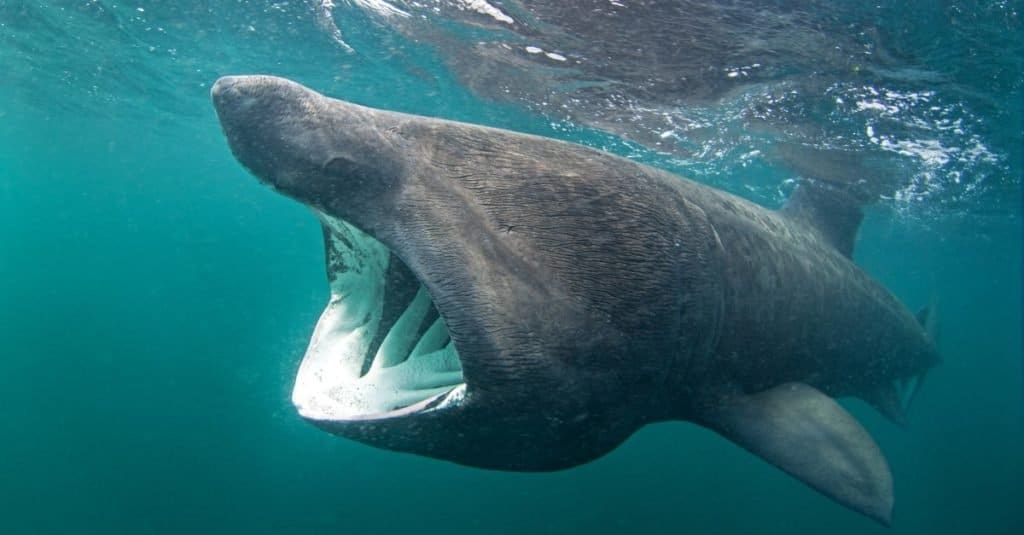
Basking sharks
are listed as endangered due to overfishing, net entanglement, and ship collisions.
©Martin Prochazkacz/Shutterstock.com
Great white sharks have been decreasing in numbers for many decades due to overfishing and poaching, but they are currently not considered endangered. Rather, they are listed as vulnerable. Unfortunately, there are multiple shark species today that are listed as either endangered or critically endangered by the IUCN. Below is a list of some endangered shark species:
- Great Hammerhead Shark (Sphyrna mokarran) These sharks, which can be found in the Atlantic, Indian, and Pacific Oceans, as well as the Mediterranean Sea, are listed as critically endangered due to overfishing for the shark fin trade and habitat loss.
- Scalloped Hammerhead Shark (Sphyrna lewini) Like the great hammerhead, the scalloped variety is also critically endangered due to the shark fin trade. Additionally, they are vulnerable due to getting caught in fishing gear meant to catch other varieties of fish.
- Dusky Shark (Carcharhinus obscurus) These sharks are listed as endangered in the Northwest Atlantic Ocean, and vulnerable worldwide, due to overfishing for their valuable fins, meat, and liver oil.
- Whale Shark (Rhincodon typus) While these sharks are protected in many countries, they still fall victim to accidental entanglement in fishing gear, strikes from ships, and illegal poaching. They are listed as endangered.
- Angelshark (Squatina squatina) These sharks, found in the northeastern Atlantic Ocean and the Mediterranean Sea, are listed as critically endangered due to overfishing, habitat loss, and degradation.
- Basking Shark (Cetorhinus maximus) Historically, basking sharks were hunted for their liver oil, used to make vitamin A, lamp oil, and tanning leather. Today they are also hunted for their fins, and fall victim to net entanglement and collisions with ships.
The photo featured at the top of this post is © Byron K. Dilkes/Shutterstock.com
Thank you for reading! Have some feedback for us? Contact the AZ Animals editorial team.







